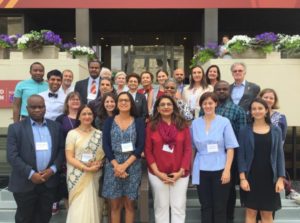
The Fistula Care Plus (FC+) project at EngenderHealth and the Maternal Health Task Force, part of the Women and Health Initiative at the Harvard T H Chan School of Public Health, co-convened a technical consultation on July 27-28, 2017 to examine issues affecting the safety and quality of Cesarean section services in low resource settings. This meeting follows on studies by FC+ and others documenting that a substantial proportion of fistula cases seen at fistula repair sites is now iatrogenic – caused by errors during medical procedures, especially cesarean section. On the first day, presenters summarized current evidence related to Cesarean section provision, including an assessment of global trends, flashpoints that affect safety and quality, and country-level insights. These presentations demonstrated that Cesarean section services are often provided in settings where minimum standards for clinical decision-making, surgical safety, and counseling and consent cannot be attained due to severe resource gaps. Participants from sub-Saharan Africa and South Asia provided examples of the effects of gaps in workforce, infrastructure, and quality assurance (QA) on service delivery. While the focus of the meeting was not on Cesarean section rates, presentations clearly demonstrated that both underuse and overuse are problems with significant implications for maternal and newborn health – and that “too much” and “too little” often coexist in the same country and sometimes even the same facility. The discussion also highlighted important gaps in knowledge, such as the lack of evidence-based guidelines for labor monitoring and intrapartum risk assessment to facilitate appropriate decision-making for Cesarean section. On the second day, participants synthesized these findings, developing a consensus action agenda to improve Cesarean section safety and quality. Participants also identified immediate actions that the maternal health and OB-GYN communities can undertake to collaborate with the safe surgery community and disseminate the recommendations of this consultation to local, regional, and global stakeholders.The full meeting report, LSHTM landscape research, andmeeting presentations are provided below.
Report of Technical Consultation on Cesarean Section Safety and Quality in Low Resource Settings (English, PDF, 3345 KB) (French, PDF, 933KB)
The Landscape of Cesarean Section in Sub-Saharan Africa and South and Southeast Asia (English, PDF, 2488 KB) November 2017. London School of Hygiene and Tropical Medicine and EngenderHealth. This report seeks to assess the landscape of cesarean sections in LMICs using recent, comparable, nationally representative survey data by analyzing DHS data from 44 countries in Sub-Saharan Africa and South and Southeast Asia between 2002 and 2016.
Caesarean section provision and readiness in Tanzania: analysis of cross sectional surveys of women and health facilities over time (English, PDF, 1080 KB). Published by Dr. Francesca Cavallaro et al. BMJ Open, 2018. This paper expands on the Tanzania cesarean section case study in the London School analysis (see above), and is the first known study to describe trends in caesarean sections and facilities performing caesareans over time in Sub-Saharan Africa and examine the readiness of such facilities in terms of infrastructure, equipment, and staffing.
Caesarean Section Provision and Capacity in Health Facilities in Tanzania (English, PDF, 1015 KB) London School of Hygiene and Tropical Medicine and EngenderHealth, December 2018. Based on an analysis of trends in caesarean section data from Tanzania, this policy brief outlines recommendations to improve capacity to provide safe caesarean sections in the country’s health facilities.
Webinar Recordings
“Webinar on Cesarean Section Safety and Quality in Low-Resource Settings: Highlights from a Global Technical Consultation”- November 9, 2017.
Presentations from Technical Consultation
Hannatu Abdullahi- Senior Family Planning and Reproductive Health Advisor, Jhpiego/MCSP. Human Resources: Workforce Density in Nigeria
Fernando Althebe– Director, Department of Mother and Child Health Research, Institute for Clinical Effectiveness and Health Policy (IECS), Argentina. Clinical Decision Making and Patient Selection: Protocols and Practice
Lenka Benova, Francesca Cavallaro, Oona M.R. Campbell– London School of Health and Tropical Medicine. The landscape of caesarean sections in low-resource settings: Who, where, and why?
Manju Chhugani– Principal/Dean, Rufaida College of Nursing, Jamia Hamdard. C-section Safety & Quality: The South Asian Context
Luis Gadama– University of Malawi, College of Medicine. Human Resources: Task Shifting for Cesarean Section in the Malawi Context
Kathleen Hill– Maternal Health Team Lead, Jhpiego/MCSP. Informed Consent for Cesarean Section and Women’s Rights
Lina Roa– Paul Farmer Global Surgery Fellow, Program in Global Surgery and Social Change, Harvard Medical School. Safe Surgery: An Emerging Global Movement
Lauri Romanzi– Project Director, Fistula Care Plus Project, EngenderHealth. Anesthesia Care
Neel Shah– Director of Delivery Decisions Initiative, Ariadne Labs and Assistant Professor of Obstetrics and Gynecology, Harvard Medical School. Reducing Harmful Overuse of Cesarean Deliveries
John E. Varallo– Senior Maternal Health Technical Advisor, Jhpiego/MCSP. Infection Prevention and Management ; Safer Cesarean Births- Tanzania
Bellington Vwalika– Senior Consultant and Professor of Obstetrics and Gynaecology, University Teaching Hospital/University of Zambia School of Medicine. Cesarean Section Safety and Quality in Low Resource Settings- Zambia’s Experience


